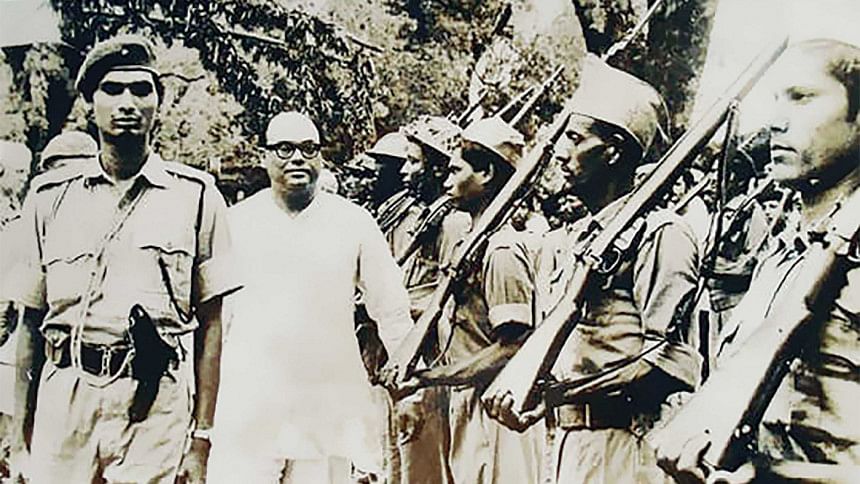Historic Mujibnagar Day: No ordinary guard of honour

Amid threats of airstrikes, a turning point in the history of an independent nation was about to unfold and the stage was almost set for a defining moment in Bangladesh's Liberation War.
Everything necessary -- the makeshift dais, the flag to be hoisted, an ensemble ready to sing what would eventually become the national anthem -- were prepared for the swearing-in ceremony of the first Bangladesh government on the morning of April 17, 1971.
Tawfiq-e-Elahi Chowdhury, sub-divisional officer of the erstwhile Meherpur sub-division, during a last-minute inspection of the arrangements for the momentous occasion, found there was no sign of Major Abu Osman Chowdhury, the then commander of the fourth wing of East Pakistan Rifles located in Chuadanga.
Osman was supposed to lead the group presenting the guard of honour to dignitaries of the new independent state.
"What could we do in case Major Osman does not turn up in time?" Tawfiq asked Mahbub Uddin Ahmed, the then sub-divisional police officer of Jhenaidah, who was given the status of captain at that time.
Mahbub said, "If you want, I can make a snap preparation with the people guarding the BOP [border outpost]. I have been trained in the Police Academy and those people too have been taught how to present a guard of honour…"
"Go ahead," replied Tawfiq, who is now an adviser to Prime Minister Sheikh Hasina and was one of the organisers of the oath-taking ceremony.
In his book -- "Chariot of Life: Liberation War, Politics and Sojourn in Jail" -- he recalled the ceremony.
After Tawfiq spoke to him, Mahbub immediately started rehearsing the guard-of-honour presentation.
"They all knew something about how to give the guard of honour. In the rehearsal, we all remembered what to do after commands such as 'Attention', 'shoulder arms' and 'present arms'"," Mahbub recalled while talking to The Daily Star.
Under the guidance of Sahabuddin Sentu, people were practising "Aamar Sonar Bangla" at the stage wings.
ASM Abdur Rab, student leader and DUCSU vice president, was present there, said Mahbub.
Around 10:00am that day, the dignitaries reached a mango orchard in Baidyanathtola, a border area in the present Meherpur district, to attend the oath-taking ceremony, amid secrecy and tight security.
The Mujibnagar government had been formed seven days earlier, with the aim of conducting the Liberation War and officially declaring the independence of Bangladesh, known as the Proclamation of Independence.
The MNAs (Members of National Assembly) and MPAs (Members of Provincial Assembly) present in India also formed a constituent assembly.
Bangabandhu Sheikh Mujibur Rahman was declared the president of the newly born republic.
The oath of office was administered to Syed Nazrul Islam as vice president. Tajuddin Ahmad was sworn in as the prime minister, as were other ministers.
"The crowd burst into cheer and applause, with loud slogans of "Joy Bangla…," Mahbub said.
Baidyanathtala was later named Mujibnagar.
After the swearing-in, the ceremonial guards led by Mahbub, who was given the Bir Bikram gallantry award, took position in front of the dais.
Acting President Syed Nazrul Islam, with MAG Osmani, newly appointed commander-in-chief of Bangladesh Defence Forces, beside him, took the salute and an inspection of the guard followed.
The acting president raised the red, green and yellow flag amid thunderous applause.
It was hoisted with Amar Sonar Bangla sung in a melodious chorus.
The guard of honour was important as it symbolised the soldiers' allegiance to the government, said Mahbub.
M Amir-Ul Islam, then a young lawyer and politician who drafted the Proclamation of Independence, recalled the efforts to find an ideal place for the new government's formal inauguration.
The oath-taking ceremony was first planned to be held in Chuadanga on April 15. It changed as the Pakistan army launched an airstrike there.
"We then decided to hold the ceremony at Baidyanathtala in Meherpur on April 17. We took the BSF into confidence. We asked for air cover and they agreed to do so and set up anti-aircraft guns there," he said.
The location was ideal because the mango orchard there served as a natural camouflage. The place was easy to reach from the Indian side by a dirt road that connected the border post and any air raid would involve crossing Indian airspace -- a risky choice for the Pakistani Air Force.
Amir-Ul Islam, also the Awami League whip in the area in the constituent assembly, said the oath-taking ceremony had to be done quickly and with utmost secrecy.
"As the international media was present, the news went all over the world."

 For all latest news, follow The Daily Star's Google News channel.
For all latest news, follow The Daily Star's Google News channel. 








Comments